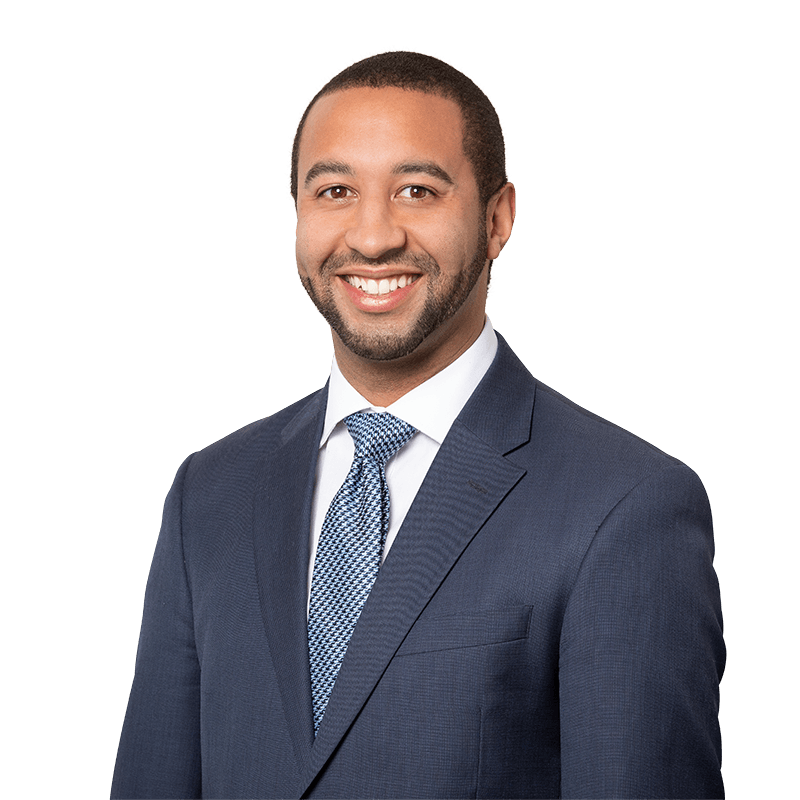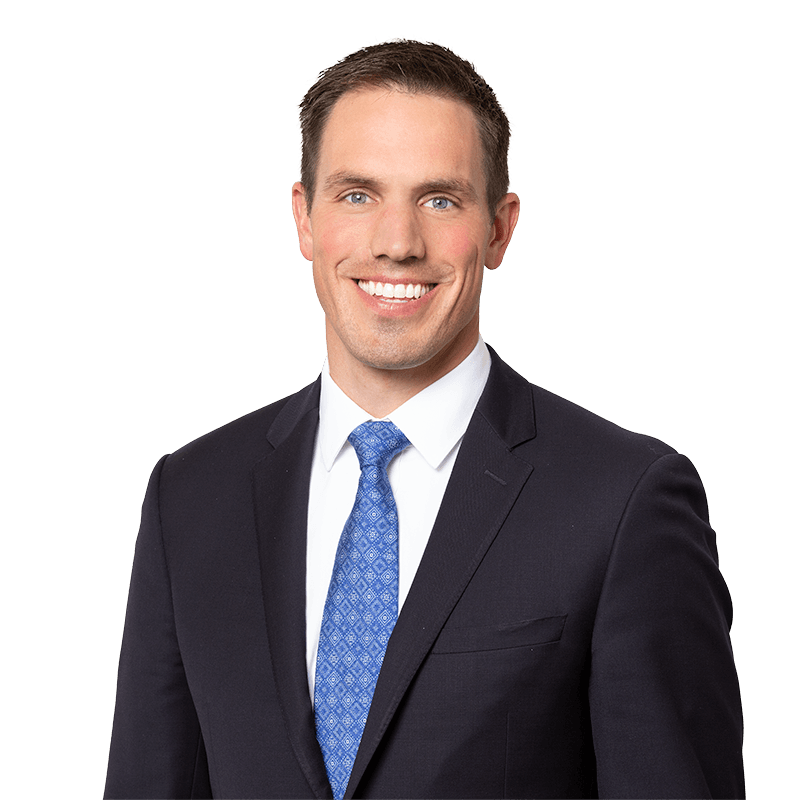
“Our goals can only be reached through the vehicle of a plan in which we must fervently believe, and upon which we must vigorously act. There is no other route to success” – Pablo Picasso

“Our goals can only be reached through the vehicle of a plan in which we must fervently believe, and upon which we must vigorously act. There is no other route to success” – Pablo Picasso
Started career off as a banker
Alumni Washburn University
President of Cherry Creek Chamber of Commerce, Young Professionals Advisory Board
Enjoys baseball & golf
Loves live music & concerts
Will video conference with clients to make it easier
Xavier Lewis is an established Wealth Advisor with a passion for empowering individuals, families, and business owners to help secure their financial futures. Drawing from his background in banking and his ability to see the bigger picture, he has been a dedicated member of the Trilogy Financial team since 2015.
With a strong commitment to his clients’ best interests, Xavier specializes in crafting personalized financial strategies that help clients pursue their goals. Xavier’s holistic approach to planning ensures every plan he and his team develop is mindful of current market trends, unforeseen headwinds, and tax efficiencies, resulting in a confident journey toward reaching your financial goals.
Outside of his role as a Wealth Advisor, Xavier wears the hat of President for the Cherry Creek Chamber of Commerce Young Professional’s Board, a role he’s held since 2020, as well as being elected to the Executive Board for the Chamber as well. These positions help strengthen his dedication to fostering community connections and shaping future leaders.
Xavier holds Finance and Business Management degrees from Washburn University, in Topeka, Kansas. He also excelled as a four-year starting pitcher for the NCAA Division II Ichabods baseball team. His professional achievements, include his Series 66, and Colorado State Life & Health Insurance Licenses.
As a Denver native, Xavier spends a lot of his free time on the golf course or out at restaurants with his new bride. He has also been a lifelong Colorado sports fan and always enjoys days watching his favorite teams play.
Xavier is solely an Investment Advisor Representative of Trilogy Capital, and not affiliated with LPL Financial.
Scroll through to see each of the Advisors






Trilogy Financial Services, a Huntington Beach, California-based hybrid managing $3 billion, has acquired E. F. Heagan & Associates of San Juan Capistrano, California, and Mandichak Investment Retirement & Estate Planning, of Laguna Niguel, California.
Terms of the acquisitions were not disclosed.
The two firms add $160 million in assets under management to Trilogy’s total and brings more than 500 new clients. Read More.
Trilogy Financial, formerly part of the National Planning Holdings network bought by LPL Financial in August, says it will affiliate with the independent broker-dealer. The Huntington Beach, California-based group has some 150 financial advisors and over $2 billion in client assets.
Sure, one of the most popular reasons for buying life insurance is ensuring your family’s financial security after your homegoing. But the truth is, life insurance has many living benefits, too. Some term life insurance policies allow you to access a portion of your death benefit if you are ever diagnosed with a terminal, critical or chronic illness, which you can use however you wish.
Power of cash value
And permanent life insurance has the ability to accumulate cash value. You can use that money for whatever you like, such as for an emergency, a down payment on a house, or college—no questions asked! Or you can let the cash value continue to grow, which could supplement your retirement income.* The choice is yours.
Learn more about life insurance’s living benefits. Contact an Trilogy Advisor today.
Download this comprehensive blog as a concise one-page here: Life Insurance Myth
In the heart of a bustling town, Ernesto “Peanut” Folks stood as the owner of an auto body repair shop, where years of hard work and dedication had woven into the very fabric of his business. His vision for the future was crystal clear—passing the torch and the legacy of his shop to his son, Ernesto. This is the remarkable story of how life insurance, often overlooked, can emerge as a beacon of hope and resilience when we need it most.
Ernesto “Peanut” Folks was the proud owner of an auto body repair shop, and his plan was to one day pass along the business to his son, Ernesto. Life insurance was never on Peanut’s radar until an insurance professional spoke to him about how it could help him protect the business and its 10 employees.
Downturns in the business would sometimes make it hard for Peanut to make his premium payment. He considered dropping the policy but ultimately kept it in place.
When Peanut was diagnosed with advanced-stage lung cancer, his doctors gave him just six months to live. The treatments that followed kept him away from work, and medical bills mounted.
Given his terminal diagnosis, a provision in his life insurance policy called an accelerated death benefit allowed him to access a portion of the money from that policy while he was still alive. In the months before his death at age 49, Peanut was able to pay off his debts and turn the body shop over to Ernesto, fulfilling his dream.
Talk to an insurance professional about how life insurance can protect your business and your legacy.
Download this comprehensive blog as a concise one-page here: Life Insurance Keeps a Business in the Family
The pandemic’s economic disruption altered people’s views on a wide range of money topics—from the feeling of financial insecurity to the extra burden of debt, to how best to protect their loved ones, physically and financially. People’s interest in life insurance—knowing they have a need for it—was heightened during the pandemic and remains so, as people take a closer look at their financial security and well-being. The 2023 Insurance Barometer Study, by Life Happens and LIMRA, shows this trend is prevalent among the younger generations, as well as with single mothers.
Fewer women own life insurance than men, 49% vs. 55% respectively. And that number is even starker for single moms: Just 2 of 5 single mothers (40%) own life insurance. That said, 6 in 10 single moms (59%) know they have a life insurance need gap—meaning they need coverage or more of it (vs. 41% of all adults) equaling about 5 million households. And 4 in 10 (38%) say they intend to buy coverage this year. With 7.9 million single-mom households, according to the U.S. Census Bureau, there is a dire need for single moms to
purchase life insurance, or more of it.
The primary reason single moms own life insurance (63%) is the same as the general population: to cover burial costs. However, only 26% say they have it to replace lost income. And more than half (51%) say they are “extremely concerned” about leaving dependents in a difficult financial situation if they died prematurely, vs. 29% of the general population.
That’s not the only area of financial concern. In fact, single moms have increased levels of concern over a wide range of financial issues—often double-digits—over the general population.
• Having money for a comfortable retirement: 58% vs. 44%
• Saving for an emergency fund: 56% vs. 38%
• Paying monthly bills: 50% vs. 32%
• Ability to afford college: 40% vs. 22%
Owning life insurance makes people feel more financially secure: 69% of life insurance owners feel secure vs. 49% who don’t own. For single moms, this is 52% of owners feel secure vs. 30% who don’t own. The good news is that while only a third of single moms (35%) work with a financial advisor currently, more than half without one are looking for an advisor (52%) to help them navigate their finances.
Gen Z is growing up—they’re adults now who are in the weeds of financial responsibilities and stresses. Half of Gen Z is now 18-26 years old, which means 19 million young adults are ready for life insurance, most of whom are non-owners; and Millennials, at 27 to 42, are well into their careers and starting families. The study took a look at life insurance ownership among different age groups and found that half of all adults (52%) own life insurance, with 40% of Gen Z adults and 48% of Millennials currently owning it.
As Gen Z starts hitting life milestones such as finding a partner, buying a home and having children, half (49%) say
they either need to get life insurance or increase their coverage. And Millennials are not far behind, with 47% saying so. And they are ready to take action: 44% of Gen Z adults and 50% of Millennials say they intend to buy life insurance this year.
They also want to purchase it where they have become comfortable—online—and that goes for all generations. In 2011, 64% of people said they preferred to buy life insurance in person; by 2020, just 41% felt this way. In 2023, it dropped to 29%.
There is work to do on educating people about ownership: 42% of all adults say they’re only somewhat or not at all knowledgeable about life insurance.
A quarter of Gen Z and Millennials say that not knowing how much or what kind of life insurance to buy stops them from getting coverage. And 37% of Gen Z and 27% of Millennials say
they “haven’t gotten around to it.”
Across generations, cost is cited as the top reason for not getting life insurance. But only a quarter (24%) of people correctly estimated the true cost of a policy for a healthy 30- year-old, which is around $200 a year.* More than half of Gen Z adults (55%) and 38% of Millennials thought it would be $1,000 or more.
With the current climate adding financial uncertainties to Gen Z and Millennials, including layoffs and inflation, it is imperative that the two age groups learn how to protect their loved ones financially. Education around finances in general, inclusive of life insurance, will be extremely beneficial, particularly for Millennials, who cite the highest overall level of financial concern (39%).
Download this comprehensive blog as a concise one-pager here:Millennials and Gen Z Lead Growing Need for Life Insurance in 2023
*Survey respondents were asked how much they thought a $250,000 20-year level term policy would cost per year for a healthy, nonsmoking 30-year-old, which is around $200.
Please source all statistics: 2023 Insurance Barometer Study, Life Happens and LIMRA© Life Happens 2023. All rights reserved.
No one really wants to think about life insurance. But if someone depends on you financially, it’s a topic you shouldn’t avoid. Are any of these reasons stopping you from getting the life insurance coverage you need? If so, read on!
We know we can rely on our families for support as we navigate life. However, if you were to die, your family’s world would shift on its axis—emotionally and financially. A time of grief is not the time to crowdsource funeral funds or make phone calls for money every month when bills come due. Life insurance means there can be an affordable solution in place so that doesn’t need to happen.
Bills, rent or mortgage, car payments, childcare, food, gas … and the list grows as your family does. So what would happen to them financially if you died? If you’re gone, so is your income, but their bills and expenses will stay the same. If money is tight, you can’t afford not to have life insurance. It picks up the financial burden for your family when you are no longer there to do it.
Your parents taught you hard work, and it’s what you’re teaching your children. But life insurance isn’t about leaving your kids a financial windfall. It’s about practicing—and teaching—the principles of personal financial responsibility. Preparing for the future with life insurance is a lesson in goal-setting, budgeting and discipline that ensures your loved ones will be OK financially, which is a valuable lesson to pass on.
Don’t let these myths stand in the way of getting life insurance—or more of it.
Download this comprehensive blog as a concise one-page here: 3 Myths About Life Insurance
We believe that real Life Planning is progress, not perfection.
Financial Life Planning is about actually starting — taking a few good steps in the right direction and then taking a few more.
Financial Life Planning is fundamentally about taking a few good steps in the right direction and then taking a few more. Trilogy Financial has established regional offices from coast to coast with the clear vision of helping millions of Americans pursue financial independence, every day.
Some advisors associated with this material are registered representatives of LPL Financial (LPL) and are Investment Advisor Representatives (IAR’s) for Trilogy Capital Inc. (TC). Some IAR’s of TC are not registered or affiliated with LPL. Securities offered through LPL. Member FINRA/SIPC. Investment advisory services offered through TC, A Registered Investment Advisor. TC markets advisory services under the name of Trilogy Financial (“TF”), an affiliated but separate legal entity. TC and TF are separate entities from LPL. The LPL Registered Representatives associated with this site may only discuss and/or transact securities business with residents of the United States.